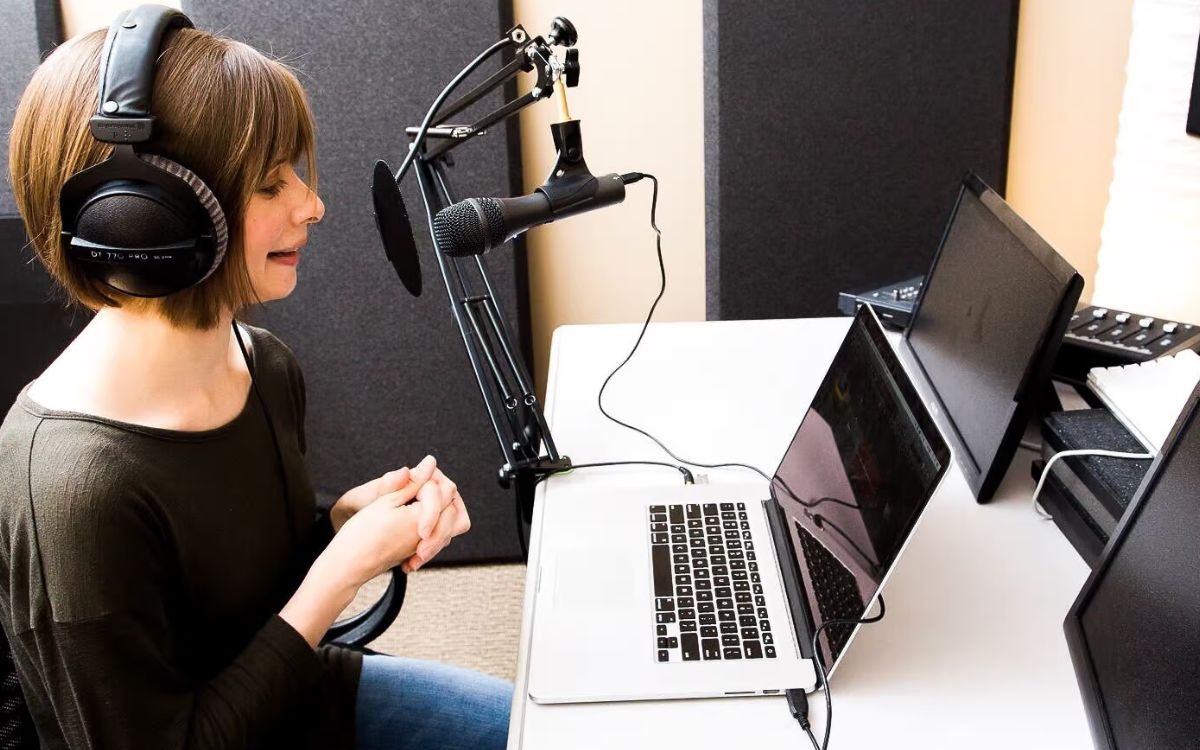Home>Events & Info>Podcast>How Do You Monetize A Podcast


Podcast
How Do You Monetize A Podcast
Published: December 13, 2023
Learn how to monetize your podcast and turn your passion into profit. Discover effective strategies and techniques for generating revenue from your podcast.
(Many of the links in this article redirect to a specific reviewed product. Your purchase of these products through affiliate links helps to generate commission for AudioLover.com, at no extra cost. Learn more)
Table of Contents
Introduction
Welcome to the exciting world of podcasting, where people from all walks of life gather to share their stories, passions, and expertise. Podcasting has rapidly evolved from a niche hobby to a mainstream form of entertainment, with millions of listeners tuning in to their favorite shows every day. However, for podcasters, creating captivating content is just the beginning. Once you have built a loyal audience, the next question that arises is: how do you monetize your podcast?
In this article, we will explore the various strategies and techniques that podcasters can employ to monetize their shows. From traditional advertising to affiliate marketing, crowdfunding to paid subscriptions, we will delve into the different avenues available to turn your podcast into a profitable venture.
While podcasting offers a unique platform for sharing and engaging with audiences, it also presents challenges for content creators who wish to generate revenue. Unlike other forms of media, such as television or radio, podcasts do not have a built-in advertising infrastructure. This means that podcasters must be proactive and strategic in their approach to monetization.
Whether you are a seasoned podcaster looking to take your show to the next level or a newbie just starting out, understanding the various monetization options available is crucial to succeed in this competitive landscape. So, let’s dive in and explore the exciting world of podcast monetization!
Understanding Podcast Monetization
Before we delve into the various strategies for monetizing your podcast, let’s first gain a deeper understanding of what podcast monetization entails. Simply put, podcast monetization refers to the process of generating revenue from your podcast through different methods. While some podcasters view their shows as a passion project or a means of sharing knowledge, many others see it as a business opportunity.
The key to successfully monetizing your podcast lies in finding the right balance between creating valuable content for your audience and implementing monetization strategies that align with your goals and values. Here are some key considerations to keep in mind:
- Target audience: Understanding your target audience is essential in determining the most effective monetization strategy. Consider their demographics, interests, and behaviors to tailor your approach.
- Podcast niche: Your podcast’s niche can also play a significant role in determining the best monetization methods. Different niches attract different advertisers and audience preferences.
- Engagement and audience size: The level of audience engagement and the size of your listener base will impact the types of monetization options available to you. Larger audiences often attract more lucrative sponsorship opportunities.
- Long-term goals: Consider your long-term goals for your podcast. Do you aspire to create a sustainable income stream or use your podcast as a marketing tool for other ventures?
By factoring in these considerations, you can tailor your monetization strategy to align with your podcast’s unique characteristics and goals.
While podcast monetization can be a profitable endeavor, it is essential to strike a balance between revenue generation and maintaining the highest possible quality of content. Authenticity and trust are highly valued in the podcasting community, and listeners can easily detect insincere advertising or excessive commercialization.
Now that we have a solid understanding of podcast monetization, let’s explore some of the most common strategies that podcasters can implement to generate revenue and make their shows financially sustainable.
Advertising and Sponsorships
Advertising and sponsorships are among the most common ways for podcasters to monetize their shows. With a loyal and engaged audience, your podcast can attract advertisers who are looking to reach your listeners.
Advertising can take various forms within a podcast. The most straightforward approach is through pre-roll, mid-roll, or post-roll advertisements, where the host or a voiceover promotes a product or service during the podcast episode. These ads can be read by the host themselves or inserted into the episode through dynamic ad insertion.
Sponsorships, on the other hand, involve partnering with a company or brand that aligns with your podcast’s niche or core values. In these arrangements, the sponsor provides financial support in exchange for promotion and mentions in multiple episodes or throughout a specific period.
When seeking advertising and sponsorship opportunities, it’s important to consider several factors:
- Podcast reach: Advertisers typically look for podcasts with a sizable and engaged audience. The number of downloads, listens, and demographic information are crucial in attracting potential sponsors.
- Podcast niche: Aligning with sponsors relevant to your podcast’s niche enhances the credibility and authenticity of the ad placements. For example, a health and wellness podcast would work well with sponsors in the fitness or nutrition industry.
- Audience appeal: Demonstrate the value and engagement of your audience to potential sponsors. Provide metrics and case studies to showcase the effectiveness of your podcast in reaching and influencing your listeners.
Podcast monetization through advertising and sponsorships involves striking a balance between featuring relevant ads and maintaining the integrity of your content. Listeners appreciate transparency, so clearly distinguish between the content and the sponsored segments.
To make it easier to manage advertising and sponsorships, many podcasters work with advertising networks or agencies that help connect them with relevant advertisers. These networks handle the logistics of ad placement, payment, and tracking, allowing podcasters to focus on creating compelling content.
Overall, advertising and sponsorships are effective ways to monetize your podcast, particularly if you have a sizable and engaged audience. By selecting appropriate sponsors and maintaining transparency, you can create a symbiotic relationship where both you and your sponsor benefit.
Affiliate Marketing
Affiliate marketing is a popular monetization strategy for podcasters that involves promoting products or services and earning a commission for any resulting sales or leads. As a podcaster, you can become an affiliate for companies that offer products or services relevant to your podcast’s niche.
The process of affiliate marketing typically involves the following steps:
- Find affiliate programs: Research and identify companies or brands that offer affiliate programs in your podcast’s niche. Look for products or services that resonate with your audience and align with your podcast topics.
- Become an affiliate: Apply to become an affiliate for the chosen programs. Many companies have an application process that evaluates your podcast’s content and audience reach before granting approval.
- Promote affiliate products: Once approved, integrate affiliate links or discount codes within your podcast episodes, show notes, or podcast website. You can discuss the benefits of the products or share personal experiences to encourage your listeners to make a purchase.
- Earn commissions: When your listeners use your affiliate links or discount codes to make purchases, you earn a commission on each sale. The commission rate varies depending on the affiliate program and the product or service being promoted.
- Track and optimize: It’s important to track the performance of your affiliate marketing efforts to understand which products or promotions are generating the most conversions. This data allows you to optimize your promotions and strategically select affiliate programs in the future.
Affiliate marketing offers several benefits for podcasters. First, it allows you to monetize your podcast without directly selling your own products or services. Second, it gives you the opportunity to recommend products that you genuinely believe in and that align with your podcast’s niche, which enhances your credibility and trust with your audience.
However, it’s essential to maintain transparency with your audience when implementing affiliate marketing. Clearly disclose when you are promoting affiliate products, and ensure that you only affiliate with companies whose products or services you truly support. Honesty and authenticity are crucial in building trust with your listeners.
Additionally, it’s important to strike a balance between promoting affiliate products and providing valuable content to your audience. Focus on delivering high-quality episodes that cater to your listeners’ needs and interests, and integrate affiliate promotions in a way that feels natural and non-intrusive.
Ultimately, affiliate marketing can be a lucrative way to monetize your podcast while offering valuable recommendations to your audience. By selecting the right affiliate programs and maintaining transparency, you can create a win-win scenario for both you and your listeners.
Crowdfunding and Donations
Crowdfunding and donations provide another avenue for monetizing your podcast while engaging directly with your audience. This method involves soliciting financial support from your listeners who believe in the value of your content and want to contribute to its continuation.
There are several platforms available that facilitate crowdfunding and donation-based monetization for podcasters, such as Patreon, Ko-fi, and PayPal. These platforms enable you to create a profile or a membership program where fans can contribute either one-time or recurring donations to support your podcast.
Here’s how crowdfunding and donations can benefit podcasters:
- Engagement and community building: By implementing crowdfunding, you can foster a sense of community among your audience. Supporters become more invested in your podcast’s success and feel a sense of ownership, which can translate into increased engagement and loyalty.
- Resource and equipment investment: Financial contributions from crowdfunding and donations can be used to improve the quality of your podcast. Whether it’s upgrading equipment, hiring editors, or investing in marketing, the funds can help you take your podcast to the next level.
- Exclusive perks and bonus content: As an incentive for donations, you can offer exclusive perks to your supporters. These can include access to ad-free episodes, early access to new episodes, bonus content, merchandise, or even personalized shout-outs.
When implementing crowdfunding and donation-based monetization, it’s essential to clearly communicate the purpose of the funds and how they will be used to enhance the podcast. Transparency is key in gaining the trust and support of your audience.
Additionally, regularly engaging with your supporters and providing updates on how their contributions are making a difference helps maintain their enthusiasm and encourages continued support. Show your appreciation by acknowledging and thanking your donors, whether through social media shout-outs or personalized messages within your episodes.
Remember that while crowdfunding and donations can be a viable method of monetization, it’s important to set realistic expectations. Building a significant donor base takes time and effort, and success varies depending on the size and engagement of your audience.
Overall, crowdfunding and donations allow your listeners to directly contribute to the sustainability of your podcast. By offering exclusive perks and fostering a sense of community, you can turn your loyal listeners into dedicated supporters who are invested in the success of your show.
Paid Subscriptions and Premium Content
Paid subscriptions and premium content provide a monetization model that offers exclusive access and additional value to your most dedicated listeners. With this strategy, you can create a tiered system, where certain content or perks are reserved for paying subscribers.
Implementing a paid subscription model requires careful consideration and planning to ensure that the content offered justifies the cost. Here are some key aspects to keep in mind:
- Content differentiation: To entice listeners to subscribe, you’ll need to offer unique and compelling content that is not available to non-subscribers. This can include bonus episodes, extended interviews, behind-the-scenes content, or access to a private community.
- Value proposition: Clearly communicate the value that subscribers will receive for their payment. Highlight the exclusive benefits and make it clear why subscribing is a worthwhile investment.
- Pricing and flexibility: Determine a pricing structure that is fair and aligns with the value you are providing. Consider offering different subscription tiers at varying price points to cater to different listener preferences and budgets.
- Consistency and quality: Delivering consistent and high-quality content is crucial when implementing a paid subscription model. Subscribers expect premium content, so maintaining a high standard is essential to retain their loyalty and satisfaction.
Platforms like Patreon and Supercast are popular choices for hosting paid subscription content. These platforms offer smooth integration, payment processing, and the ability to manage and communicate with your subscriber base effectively.
It’s important to remember that while paid subscriptions can be an effective monetization strategy, not all listeners may be willing or able to pay for premium content. Therefore, it’s crucial to strike a balance between offering valuable free content to attract and retain a broad audience, while also providing exclusive content for paid subscribers.
Communicate the benefits of subscribing to your audience and don’t overlook the importance of building and nurturing a strong connection with both free listeners and paying subscribers. Ensuring that your free content remains high-quality and engaging can help convert free listeners into paid subscribers as they gain trust in your podcast’s value.
Ultimately, paid subscriptions and premium content offer an opportunity to provide exceptional value to your most loyal listeners while generating a reliable income stream for your podcast.
Merchandise and E-commerce
Merchandise and e-commerce provide podcasters with an opportunity to monetize their shows through the sale of branded products and other related merchandise. By creating and selling physical or digital items, you can not only generate revenue but also deepen the connection with your audience.
Here are some merchandise and e-commerce strategies that you can consider:
- Branded merchandise: Create and sell merchandise featuring your podcast’s logo, catchphrases, or memorable quotes. This can include items such as t-shirts, hats, stickers, mugs, or even custom-designed products specific to your podcast’s theme.
- Digital products: Offer digital products like e-books, exclusive guides, or access to a resource library. This allows you to leverage your expertise and provide additional value to your audience in a convenient and downloadable format.
- Affiliate partnerships: Partner with relevant brands as affiliates to offer products or services that align with your podcast’s niche. By promoting and selling these products, you can earn a commission for each purchase made through your affiliate links.
- Collaborations: Explore collaborations with other podcasters or creators within your niche to create co-branded merchandise or joint ventures. This can help expand your reach and attract new audience members.
- Online store: Set up an online store on your podcast’s website or use e-commerce platforms like Shopify or BigCommerce to sell your merchandise. Streamline the purchasing process and offer various payment options to ensure a seamless shopping experience for your audience.
When considering merchandise and e-commerce as a monetization strategy, it’s important to strike a balance between promoting your products and providing valuable content. Focus on creating a strong relationship with your audience first, ensuring that your merchandise aligns with their interests and extends the connection they have with your podcast.
Additionally, investing in high-quality and visually appealing designs is crucial to attract and retain customers. Collaborating with talented graphic designers or investing in professional branding can contribute to the success of your merchandise sales.
Regularly promote your merchandise on your podcast, social media channels, and website. Consider offering exclusive discounts or limited-edition items to create a sense of urgency and encourage purchases. Engage with your audience by sharing photos or testimonials from satisfied customers to build trust and showcase the value of your merchandise.
Merchandise and e-commerce offer podcasters an opportunity to monetize their creativity while building a loyal community. By providing unique and appealing products, you can not only generate revenue but also fuel the enthusiasm and support of your audience.
Events and Live Shows
Events and live shows provide an exciting and engaging way for podcasters to monetize their shows while connecting with their audience on a more personal level. Whether it’s a live recording, a panel discussion, or a workshop, hosting events can generate revenue and strengthen the bond with your listeners.
Here are a few ways to monetize events and live shows:
- Ticket sales: Sell tickets to your live events, setting a price that covers the costs of organizing the event and generates a profit. Offering early bird discounts or VIP packages can entice your audience to purchase tickets in advance.
- Sponsorships and partnerships: Secure sponsorships from companies or brands that align with your podcast’s niche. In return for financial support, offer visibility and promotion during the event. This can include logo placement, mention in the event marketing materials, or an opportunity to showcase their products.
- Merchandise sales: Set up a merchandise booth at your events to sell branded merchandise to attendees. This not only generates additional revenue but also serves as a marketing opportunity for your podcast.
- Meet and greet sessions: Offer exclusive meet and greet sessions with attendees before or after the event. This allows you to engage with your fans on a more personal level, creating a memorable experience that they might be willing to invest in.
- Workshops or masterclasses: Host workshops or masterclasses where you can share your expertise or invite industry experts as guest speakers. Charge registration fees for attendees to participate and learn valuable skills or insights.
- Live show recordings: Record your podcast episodes in front of a live audience. Sell tickets to the live recording and create a unique experience with added entertainment value for attendees.
When planning events and live shows, it’s essential to consider logistics such as venue selection, equipment needs, and marketing efforts to ensure a successful and profitable event. Utilize social media platforms, your podcast website, and email newsletters to promote the event and generate buzz among your audience.
Additionally, engaging with your audience during these events can be a powerful way to deepen the connection. Take the time to interact with attendees, answer questions, and gather feedback. This not only enhances the overall experience but also strengthens the loyalty and support of your listeners.
Remember, while events and live shows can be profitable, they require careful planning, organization, and promotion. But when executed effectively, they can become a significant revenue stream while fostering a sense of community among your audience.
Licensing and Syndication
Monetizing your podcast through licensing and syndication involves partnering with third-party platforms or networks to distribute and monetize your podcast content. This strategy allows you to reach new audiences and generate revenue through licensing fees or revenue sharing agreements.
Here are two common avenues for licensing and syndication:
- Licensing to Podcast Networks: Podcast networks are platforms that curate and distribute multiple podcasts. By licensing your podcast to a network, you can benefit from their existing listener base and advertising partnerships. In return, the network typically offers support in terms of marketing, production, and monetization. Licensing terms can vary, but they often involve a revenue sharing agreement where you receive a portion of the advertising revenue generated by your podcast.
- Content Syndication: With content syndication, you have the opportunity to share your podcast content with other platforms or media outlets. These platforms, such as radio stations or other podcast networks, then distribute your episodes to their audience. Syndication agreements can take different forms, including licensing fees paid upfront or a revenue sharing model based on advertising or sponsorship revenue.
When considering licensing and syndication opportunities, carefully evaluate the terms and conditions of the agreement. Ensure that the partnership aligns with your podcast’s brand, values, and goals. Consider factors such as the platform’s reach, audience demographics, and the support they offer in terms of marketing and monetization.
While licensing and syndication allow you to expand your podcast’s reach and potentially increase revenue, it’s important to be aware that you may have less control over the distribution and monetization process compared to self-hosting. Be sure to weigh the benefits of wider exposure against the potential trade-offs of giving up some control.
Additionally, maintaining consistent branding and high-quality content is crucial to attract and retain audiences through licensing and syndication. Your podcast should remain recognizable across different platforms to build trust and solidify your reputation as a reputable content creator.
Ultimately, licensing and syndication offer podcasters the opportunity to grow their audience, increase revenue, and tap into new distribution channels. By carefully selecting the right partnerships and maintaining the integrity of your content, you can leverage these opportunities to further the success of your podcast.
Conclusion
Monetizing your podcast can transform it from a passion project into a sustainable business venture. While there is no one-size-fits-all approach to podcast monetization, understanding the various strategies and selecting the right ones for your podcast can help you generate revenue and achieve long-term success.
Advertising and sponsorships provide an effective way to monetize your podcast through partnerships with brands that align with your content. Affiliate marketing allows you to earn commissions by promoting products or services relevant to your audience. Crowdfunding and donations offer a direct way for your listeners to support your podcast financially, fostering a sense of community and engagement.
Paid subscriptions and premium content give you the opportunity to provide exclusive value to your most dedicated listeners, while merchandise and e-commerce allow you to extend your podcast’s brand and provide tangible products. Hosting events and live shows create a unique and personal experience for your audience, while licensing and syndication enable you to reach new audiences and expand your podcast’s reach.
When implementing these strategies, it’s important to maintain authenticity, transparency, and a strong connection with your audience. Provide valuable content, remain true to your podcast’s niche, and communicate openly about any monetization efforts.
Remember, success in podcast monetization takes time, effort, and experimentation. It’s important to track and analyze your results, adjust your strategies as needed, and adapt to changes in the podcasting landscape. Stay informed about industry trends and continue to provide value to your audience in order to thrive in this competitive market.
Ultimately, monetizing your podcast should not compromise the quality or integrity of your content. Focus on creating meaningful connections with your audience, delivering valuable episodes, and finding creative ways to generate revenue. By striking the right balance between monetization and content creation, you can turn your podcasting passion into a sustainable and rewarding venture.











